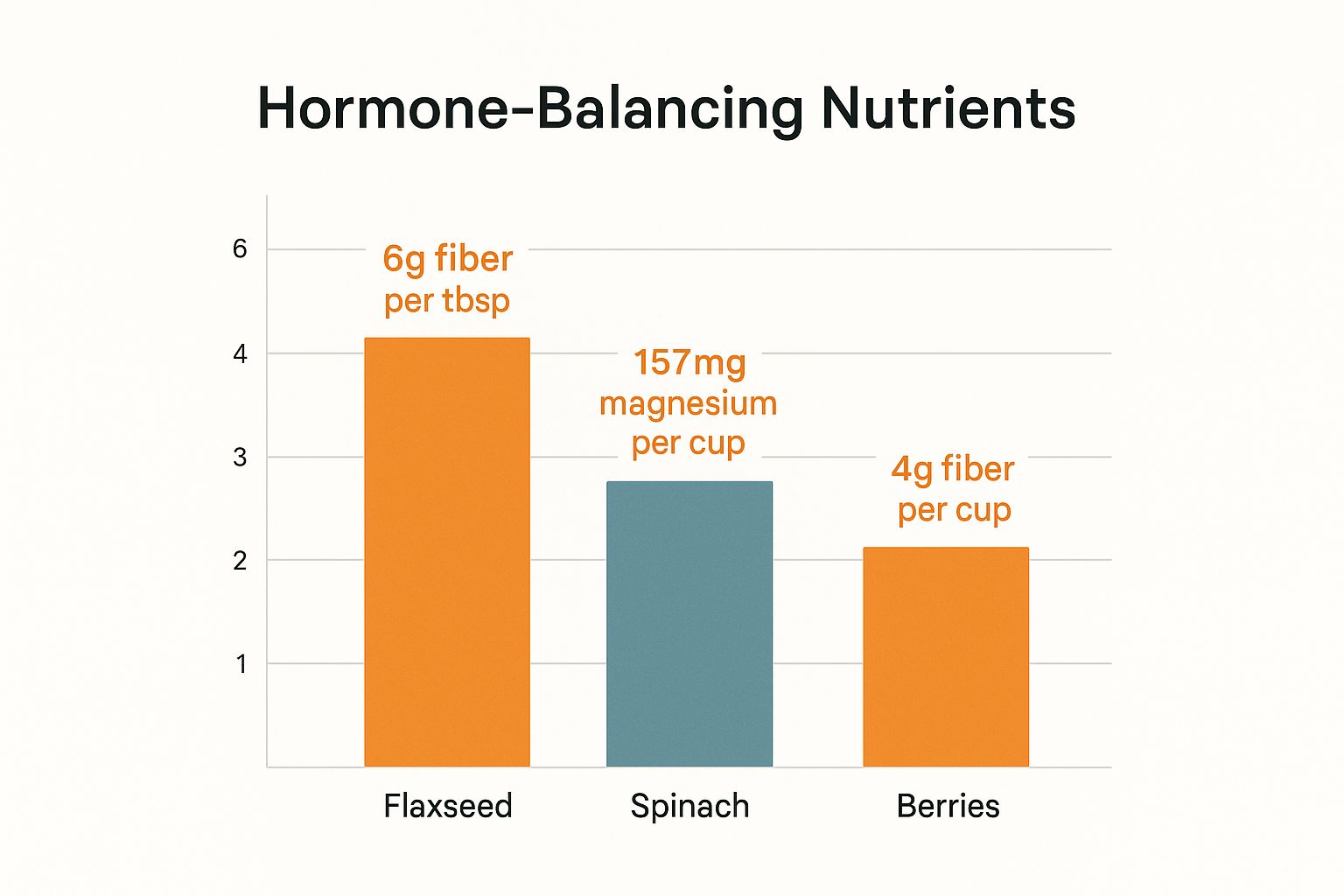How to Balance Hormones Naturally for Better Health

Feeling a little "off" is more than just a bad day—it's often your body's way of sending up a flare. Learning how to balance your hormones naturally begins with paying attention to these signals. They're clues that can reveal underlying imbalances causing everything from nagging fatigue to unpredictable mood swings.
Listening to your body is the first, most crucial step toward reclaiming your health and feeling like yourself again.
Decoding the Signs of Hormonal Imbalance
Figuring out if you have a hormonal imbalance is a bit like being a detective. You start to notice clues: persistent fatigue that no amount of coffee can fix, mood swings that feel completely out of character, or stubborn weight that won't budge no matter what you do.
These aren't just random annoyances. They're often the direct result of fluctuations in your body's powerful chemical messengers.

Before you can build a plan that actually works, you need to know the key players and the roles they're supposed to be playing. Hormones like estrogen, cortisol, and thyroid hormones are conducting a delicate orchestra inside you. When one instrument is out of tune, the whole performance can feel chaotic.
The Major Hormonal Players
Think of your hormones as your body's internal management team. Each one has a specific job, and they all need to communicate seamlessly to keep things running smoothly.
-
Estrogen and Progesterone: These are the primary female sex hormones, in charge of regulating menstrual cycles and reproductive health. When they're out of sync, you might experience irregular periods, intense PMS, and moodiness.
-
Testosterone: While it's often labeled a "male" hormone, testosterone is vital for both sexes. It influences everything from muscle mass and bone density to libido. For men, learning how to keep levels optimal is a cornerstone of vitality, a topic we explore in our guide on how to increase testosterone naturally.
-
Cortisol: Meet the "stress hormone." Cortisol's job is to help your body respond to pressure, but chronic stress keeps it cranked up way too high. The fallout? Disrupted sleep, a weakened immune system, and weight gain—especially around your middle.
-
Thyroid Hormones (T3 and T4): Your thyroid gland produces these hormones to control your metabolism. If it's underactive (hypothyroidism), you might feel sluggish, gain weight, and battle depression. If it's overactive (hyperthyroidism), you could be dealing with anxiety, weight loss, and a racing heart.
-
Insulin: Produced by the pancreas, insulin manages your blood sugar by helping cells absorb glucose for energy. When your cells stop responding properly—a common issue called insulin resistance—it can lead to high blood sugar and those dreaded energy crashes.
Connecting Symptoms to the Source
The tricky thing about hormonal symptoms is that they rarely show up alone. They often overlap, creating a confusing picture. The secret is to start looking for patterns.
For example, do you feel completely drained in the morning but then get a "second wind" at night that leaves you wired and anxious? That's a classic sign of a dysregulated cortisol rhythm.
Hormonal imbalance isn't just one symptom; it's a constellation of signals your body sends when it's struggling to maintain its internal balance. Recognizing these patterns is the first, most empowering step toward taking control of your health.
Consider this all-too-common scenario: a woman in her late 30s is dealing with worsening PMS, cystic acne along her jawline, and can't seem to lose weight. These issues might seem unrelated, but they could all point to estrogen dominance, where estrogen levels are too high in relation to progesterone.
Or think about the man who feels constantly exhausted, has a low sex drive, and just can't find his motivation anymore. These are telltale signs that his testosterone levels might be dipping.
Once you start connecting these dots, you move from feeling frustrated by your symptoms to understanding their root cause. That knowledge is power. It turns confusion into clarity and gives you a clear path to action.
Your Plate, Your Hormones: The Food Connection
What you put on your plate is one of the most powerful and direct ways to influence your hormonal health. This isn't about jumping on a restrictive diet or cutting out entire food groups. It’s about building a sustainable way of eating that gives your endocrine system the raw materials it needs to thrive.
The connection is surprisingly simple: your hormones are literally built from the fats, proteins, and micronutrients you eat. If those building blocks are low-quality or missing, your body can't construct the balanced hormonal profile you need to feel your best.
Build Your Foundation with Healthy Fats
For decades, fat was unfairly demonized, but it's absolutely non-negotiable for hormone production. Cholesterol, which we get from healthy fats, is the precursor to major hormones like estrogen, testosterone, and cortisol.
Without enough quality fat in your diet, your body simply lacks the fundamental ingredients to create them. Think of it like trying to build a house without any bricks.
Prioritizing these fats can make a huge difference:
- Monounsaturated Fats: Found in avocados, olive oil, and almonds, these support cellular structure and help cool inflammation.
- Omega-3 Fatty Acids: Abundant in fatty fish like salmon, chia seeds, and walnuts, these are superstars for lowering cortisol and calming systemic inflammation.
- Saturated Fats (from good sources): Quality sources like coconut oil and grass-fed butter provide concentrated energy and are vital for hormone synthesis.
A practical way to get these in is to add half an avocado to your smoothie, drizzle olive oil on your salads, or snack on a handful of walnuts instead of processed crackers. Small, consistent additions are what build a strong hormonal foundation.
Anchor Your Meals with Quality Protein
Protein does a lot more than just build muscle; it’s essential for stabilizing your blood sugar and supporting your metabolism. Every meal should be anchored by a quality protein source to prevent the energy spikes and crashes that throw your hormones—especially insulin and cortisol—into a frenzy.
When you eat a carb-heavy meal without enough protein, your blood sugar can soar and then plummet. This rollercoaster sends a stress signal to your body, prompting a cortisol release and contributing to a cycle of fatigue and cravings.
Aim for a palm-sized portion of protein with every meal. Great options include:
- Grass-fed beef or bison
- Pasture-raised chicken and eggs
- Wild-caught salmon or cod
- Legumes like lentils and chickpeas
- Organic tofu or tempeh
A well-balanced plate with adequate protein sends a message of satiety and stability to your brain and body. This simple act prevents the hormonal panic that comes from blood sugar instability, keeping you energized and in control.
Choose Your Carbs Wisely
Carbohydrates are your body's preferred energy source, but the type you choose matters immensely. Refined carbs found in white bread, pastries, and sugary drinks are digested way too fast, leading to that blood sugar rollercoaster we want to avoid.
Instead, focus on complex, fiber-rich carbohydrates that provide a slow, steady release of energy. This gentle energy curve supports stable insulin levels and prevents those mood-altering crashes.
This infographic shows just how nutrient-dense a few hormone-friendly foods can be.

It really highlights how adding simple whole foods can significantly boost your intake of fiber and magnesium—both of which are crucial for hormone regulation.
Support Detoxification with Cruciferous Veggies
Your liver is a detoxification powerhouse, responsible for breaking down and getting rid of excess hormones, particularly estrogen. Cruciferous vegetables contain a compound called indole-3-carbinol, which actively supports this vital process.
Loading up on these vegetables helps ensure that used hormones are efficiently cleared from your system, preventing them from recirculating and causing imbalances like estrogen dominance. Try to sneak in one or two servings daily.
To make this easier, here's a quick reference guide to some of the most impactful food groups for hormonal health.
Hormone-Supportive Foods and Their Benefits
A quick reference guide to key food groups that support hormonal health, detailing their specific benefits and easy ways to include them in your diet.
| Food Group / Nutrient | Primary Hormonal Benefit | Examples |
|---|---|---|
| Cruciferous Vegetables | Supports liver detoxification of excess estrogen. | Broccoli, Cauliflower, Brussels Sprouts, Kale |
| Healthy Fats | Provides the building blocks for steroid hormones. | Avocado, Olive Oil, Salmon, Nuts, Seeds |
| Quality Protein | Stabilizes blood sugar and supports metabolism. | Grass-fed Meat, Wild Fish, Eggs, Legumes |
| Fiber-Rich Foods | Promotes healthy digestion and hormone elimination. | Berries, Flaxseed, Leafy Greens, Lentils |
Think of this table as your cheat sheet for building a hormone-friendly plate. Focusing on these categories can make a profound difference over time.
Foods and Drinks to Approach with Caution
Just as some foods build your hormones up, others can tear them down. Sugar and processed ingredients are major culprits, driving inflammation and disrupting insulin signaling. Excess caffeine can also elevate cortisol, keeping your body in a perpetual state of low-grade stress.
This doesn't mean you can never have coffee or a treat again. The goal is mindful consumption—understanding how these items affect your body and making choices that align with your health goals most of the time.
The power of lifestyle changes, especially diet, is profound. For instance, aging men naturally see testosterone levels decline by about 1% to 2% per year, which can increase risks for chronic disease. However, consistent dietary improvements and exercise can effectively counteract this decline, supporting the entire endocrine system. You can explore more insights into how lifestyle changes support hormonal health on khni.kerry.com.
Fine-Tuning Your Daily Rhythm for Hormonal Stability
Real, lasting hormonal harmony isn’t about a single magic pill or quick fix. It’s built brick by brick, day by day, through the rhythm of your daily life. Think of your lifestyle as the conductor of your internal orchestra; when everything is in sync, your hormones play a beautiful symphony. This all comes down to three essential pillars that stabilize this rhythm: deep sleep, proactive stress management, and intelligent movement.
These three are deeply connected. Just one night of tossing and turning can send your stress hormone, cortisol, soaring the next day. That spike can then trigger intense sugar cravings and leave you feeling too drained to even think about exercise, kicking off a vicious cycle that’s tough to break. Learning how to balance your hormones naturally means getting a handle on these daily inputs.
Prioritize Deep and Restorative Sleep
Sleep isn't just downtime; it's a critical period of hormonal housekeeping and repair. During deep sleep, your body gets to work lowering cortisol, producing growth hormone for tissue repair, and fine-tuning the hormones that control your appetite, ghrelin and leptin.
When you skimp on sleep, that entire process gets thrown into chaos. Studies have shown that even a single night of bad rest can spike cortisol levels and reduce insulin sensitivity the very next day. This sets you up for nasty energy crashes and puts your body under a ton of metabolic stress.
Sleep is your body's non-negotiable reset button. Treating it as a luxury instead of a biological necessity is one of the fastest ways to derail your hormonal health. Aim for 7 to 9 hours of quality, uninterrupted sleep each night.
To reclaim your nights and support this crucial process, you can start building a better sleep routine:
- Create a Dark, Cool Cave: Your body produces melatonin, the sleep hormone, in response to darkness. Use blackout curtains and aim for a room temperature around 65°F (18°C).
- Power Down Your Screens: That blue light from your phone, tablet, and TV is a melatonin killer. Turn off all screens at least an hour before you plan to hit the pillow.
- Stick to a Consistent Bedtime: Going to bed and waking up around the same time every day—yes, even on weekends—helps anchor your body's internal clock, also known as your circadian rhythm.
Actively Manage Your Stress Response
In our fast-paced world, stress often feels like a given, but its impact on your hormones is profound and direct. Chronic stress keeps your body stuck in a constant "fight-or-flight" mode, leading to perpetually jacked-up cortisol levels.
This high-cortisol state can suppress reproductive hormones, mess with your thyroid function, and contribute to insulin resistance. The key isn't to eliminate stress entirely—that's impossible—but to build resilience and develop effective ways to guide your nervous system back to a state of calm.
One of the most accessible tools you have is your own breath. Simple, controlled breathing exercises can quickly shift you out of a stressed-out state.
A Simple Box Breathing Technique:
- Inhale slowly through your nose for a count of four.
- Hold your breath for a count of four.
- Exhale slowly through your mouth for a count of four.
- Hold your breath again for a count of four.
- Repeat this cycle for 3-5 minutes.
This simple practice can significantly lower cortisol and take the edge off your anxiety. Another powerful strategy is just getting outside. Research has shown that even 20 minutes spent walking in a natural setting can measurably reduce stress hormone levels.
Move Your Body With Intention
Movement is a powerful lever for hormonal health, but the type of exercise you do really matters. The goal is to build a routine that energizes your system without just piling more stress onto it.
Different forms of movement offer unique hormonal perks. Finding a combination that feels good for your body and fits your lifestyle is crucial for sticking with it long-term.
The Hormonal Impact of Strength Training
Lifting weights or doing bodyweight exercises two to three times a week does more than just build muscle. This type of activity is fantastic for improving insulin sensitivity, which means your cells get way more efficient at using blood sugar for energy. It also provides a healthy nudge for producing testosterone and growth hormone, both of which are vital for metabolism and vitality in men and women alike.
The Benefits of Gentle Movement
On the other end of the spectrum, practices like yoga, walking, and tai chi are incredibly effective for lowering cortisol. These activities switch on the parasympathetic nervous system—your "rest and digest" state—helping to counteract the wear and tear of chronic stress. They improve blood flow and can ease the tension that often comes with hormonal fluctuations, all without overtaxing your body.
Ultimately, the best exercise routine is the one you actually enjoy and can do consistently. A balanced approach might look something like this:
- 2-3 days of strength training to support metabolism and muscle mass.
- 2-3 days of moderate cardio, like a brisk walk or cycling, for heart health.
- 1-2 days of restorative movement like yoga or stretching to keep stress in check.
By mastering these daily rhythms of sleep, stress, and movement, you create a powerful and stable foundation for hormonal balance. These pillars don't work in isolation; they reinforce one another to help your body find its natural equilibrium.
Using Supplements to Support Your Endocrine System
While a solid foundation of nutrition, sleep, and stress management is where the real work happens, strategic supplementation can offer targeted support where your body needs it most.
Think of supplements not as a magic pill but as skilled assistants, stepping in to help your endocrine system perform its complex job more efficiently. This approach is about making informed choices to complement your lifestyle, not replace it.

This shift towards proactive, natural solutions is becoming increasingly common. The global market for supplements aimed at hormone balance was valued at approximately USD 900 million in 2023 and is projected to nearly double soon. This growth reflects a worldwide recognition of using natural methods for hormone regulation, with a strong preference for supportive supplements over more aggressive therapies. You can find out more about this growing trend in natural health on datahorizzonresearch.com.
Key Supplements For Hormonal Support
Navigating the supplement aisle can feel overwhelming. To cut through the noise, let's focus on a few evidence-backed players that have a significant impact on hormonal pathways. These aren't obscure ingredients but well-researched compounds that address common deficiencies and stress responses.
- Magnesium The Relaxation Mineral: This essential mineral is involved in over 300 enzymatic reactions in the body, including those that regulate cortisol, support thyroid function, and aid in the production of sex hormones like progesterone and testosterone.
- Vitamin D The Sunshine Hormone: Technically a pro-hormone, Vitamin D is crucial for insulin sensitivity and thyroid health. Many people are deficient, especially those in colder climates, which can disrupt these vital systems.
- Ashwagandha The Stress Adaptogen: This ancient herb is an adaptogen, meaning it helps your body adapt to and manage stress. It works by modulating the hypothalamic-pituitary-adrenal (HPA) axis, which can help lower chronically elevated cortisol levels.
How These Supplements Work In Your Body
Understanding why a supplement works is just as important as knowing what to take. Magnesium, for example, helps calm the nervous system, which can directly lower cortisol and improve sleep quality—both are fundamental for anyone wanting to balance hormones naturally.
For instance, if you struggle with PMS symptoms like moodiness and cramps, a magnesium deficiency could be a contributing factor. Supplementing with a form like magnesium glycinate can often provide noticeable relief by relaxing smooth muscle tissue and supporting progesterone production.
Your body is an interconnected system. A deficiency in a single nutrient like Vitamin D doesn't just affect one hormone; it can create a domino effect that impacts your blood sugar, your mood, and your overall metabolic health.
Ashwagandha operates differently. It doesn't just force cortisol down; it helps your body regulate its stress response more intelligently. For someone feeling constantly "wired and tired," it can help restore a more natural cortisol rhythm, leading to better energy during the day and more restorative sleep at night.
To give you a clearer picture, here’s a quick rundown of some of the top supplements people turn to for hormonal support.
Top Supplements for Natural Hormone Balance
This table compares common supplements, their primary function in supporting hormones, and the conditions they are most often used for.
| Supplement | Primary Hormonal Action | Commonly Used For |
|---|---|---|
| Magnesium | Calms the nervous system, aids in hormone production, and helps regulate cortisol. | Stress, poor sleep, PMS, and muscle tension. |
| Vitamin D | Improves insulin sensitivity and supports thyroid function and immune health. | Low energy, mood swings, and metabolic concerns. |
| Ashwagandha | Modulates the HPA axis to help the body adapt to and manage chronic stress. | Adrenal fatigue, anxiety, and high cortisol. |
Each of these targets a different piece of the hormonal puzzle, showing how a tailored approach can be far more effective than a generic multivitamin.
Navigating Quality and Safety
Not all supplements are created equal. The industry isn't as tightly regulated as pharmaceuticals, so the responsibility falls on you, the consumer, to choose high-quality products.
What to look for on a label:
- Third-Party Testing: Look for seals from organizations like NSF International, USP, or ConsumerLab. This indicates the product has been independently verified for purity and potency.
- Bioavailable Forms: Choose forms your body can easily absorb. For example, magnesium glycinate is often better tolerated and absorbed than magnesium oxide.
- No Unnecessary Fillers: Avoid products with a long list of fillers, artificial colors, and allergens like gluten or soy if you are sensitive.
Before starting any new supplement regimen, it is absolutely critical to consult with a healthcare professional. They can run blood tests to identify specific deficiencies and recommend dosages that are safe and appropriate for your unique biochemistry. This step ensures you are targeting the right issues and investing in solutions that will actually work for you.
Furthermore, it's worth knowing how hormones and hunger are connected; understanding appetite regulation how peptides can help control cravings can provide additional context on how intricate these systems are.
Taming Your Environment: Create a Hormone-Friendly Home
While your daily habits are the cornerstone of hormonal health, the environment you live in plays a surprisingly powerful role. Think about it: from the plastics in your kitchen to the fragrances in your personal care products, your home is filled with items that contain hidden chemicals. Many of these can subtly throw your body's delicate endocrine system off track.
These sneaky substances are known as endocrine-disrupting chemicals (EDCs). They have the nasty ability to mimic, block, or otherwise mess with your natural hormones, which can make all your hard work to find balance feel like an uphill battle. The goal isn’t to live in a sterile bubble—that’s impossible. It’s about being mindful of your daily exposure and making a few simple, powerful swaps to lighten your toxic load.
Start in the Kitchen
The kitchen is one of the best places to make immediate, high-impact changes. It’s the hub of your home where you store, cook, and eat, creating countless opportunities for unwanted chemicals to sneak into your body.
Plastic is one of the biggest offenders. Many types contain compounds like BPA and phthalates, which are well-known EDCs. When you microwave food in a plastic container or store something acidic or fatty in it, those chemicals can leach right into your meal.
The real issue isn't a single exposure but the cumulative effect of small, daily encounters with EDCs over time. Making conscious swaps in high-contact areas like your kitchen is a powerful way to turn your home into a sanctuary that supports your health, not works against it.
Thankfully, the fix is pretty straightforward:
- Go for Glass: Ditch the plastic food containers and switch to glass alternatives. They're safer, last forever, and won't get stained or hold onto that weird leftover smell.
- Ditch Old Non-Stick Pans: If your non-stick pans are old or scratched, they might be releasing perfluorinated compounds (PFCs). It’s time to upgrade. Opt for stainless steel, cast iron, or ceramic cookware instead.
- Filter Your Water: A good water filter can significantly reduce your exposure to chlorine, heavy metals, and other potential hormone disruptors that can be found in regular tap water.
Rethink Your Personal Care Routine
What you put on your body is just as important as what you put in it. Most of us use a whole roster of personal care products every single day, and many are loaded with fragrances, parabens, and phthalates that get absorbed right through your skin.
That innocent-looking word "fragrance" on an ingredient label can actually hide a cocktail of hundreds of untested chemicals. To cut back on your exposure, you just need to make a few smart changes to your routine.
Simple Bathroom Swaps to Make Today:
- Choose Fragrance-Free: Look for lotions, soaps, and shampoos that are clearly labeled "fragrance-free" or are scented only with pure essential oils.
- Become a Label Detective: Get in the habit of scanning ingredient lists. Look for products that are free of parabens (often listed as methylparaben, propylparaben, etc.) and phthalates.
- Simplify, Simplify, Simplify: You don't need a ten-step routine to have great skin or hair. Focus on finding a few high-quality, simple products with ingredients you can actually recognize.
Clean Up Your Cleaning Game
Many of the cleaning supplies under your sink are packed with harsh chemicals that can disrupt your hormones and irritate your lungs. You can create a much healthier home just by switching to simpler, non-toxic alternatives.
And you don't need to shell out for expensive "green" products, either. Some of the most effective cleaners are probably already sitting in your pantry. A simple spray bottle filled with white vinegar and water can tackle most surfaces, and a sprinkle of baking soda is an amazing non-toxic scrubber for sinks and tubs. These easy swaps don’t just support your hormone-balancing mission—they’ll also save you money and cut down on household waste. It’s a win-win.
Your Questions on Natural Hormone Balance Answered

Diving into the world of hormonal health can feel like you’re opening a door to a thousand more questions. It’s a complex journey, and having clear, straightforward answers makes all the difference. Let’s tackle some of the most common questions I hear, giving you the clarity you need to move forward with confidence.
One of the biggest questions is always about timing: "How long until I see results?" The honest answer is that it varies for everyone. Your unique biochemistry, how severe the imbalance is, and—most importantly—your consistency with lifestyle changes all play a huge role.
That said, many people report feeling subtle shifts within 4 to 6 weeks. This might look like a little more energy in the afternoon or moods that feel more stable. More significant transformations, such as regulated cycles or noticeable weight changes, can take three months or longer. Patience is key.
Where Do I Even Start?
Feeling overwhelmed is completely normal. If you’re looking for the single most impactful first step, my advice is always the same: focus on stabilizing your blood sugar. It’s the absolute bedrock of hormonal health.
You can do this by making sure every single meal contains a quality source of protein, healthy fat, and fiber. This simple act prevents the wild blood sugar spikes and crashes that send your insulin and cortisol on a chaotic rollercoaster. It’s a foundational change that creates a positive ripple effect across your entire endocrine system.
When Should I See a Doctor?
While natural methods are incredibly powerful, they aren’t a substitute for professional medical advice. Knowing when to loop in a healthcare provider is crucial for your safety and well-being.
It’s time to book an appointment if you experience any of the following:
- Sudden or Severe Symptoms: Abrupt changes like rapid weight loss or gain, a racing heart, or extreme fatigue warrant a medical evaluation.
- Symptoms That Disrupt Your Life: If what you’re feeling is getting in the way of your ability to work, sleep, or maintain relationships, it’s time for professional support.
- No Improvement After 3-6 Months: If you’ve been consistent with lifestyle changes and see zero improvement, a doctor can run tests to identify underlying conditions.
For instance, Polycystic Ovary Syndrome (PCOS) is a common hormonal imbalance affecting 6% to 13% of women, yet up to 70% of cases go undiagnosed. Conditions like this often need a combination of lifestyle changes and targeted medical support. This can include specific supplement protocols that greatly improve hormonal balance, and you can learn more about how targeted interventions can help manage PCOS symptoms from this study.
Recognizing the line between self-care and necessary medical care is a key part of the wellness journey. Listening to your body includes knowing when it’s telling you to ask for professional help.
For men, a persistent lack of energy, low libido, and difficulty building muscle can be signs of declining testosterone. Getting a clear picture of your levels is essential. We cover this in-depth in our secrets to boosting testosterone levels science-based guide. An accurate diagnosis from a healthcare professional is the first step toward creating an effective, personalized plan that truly addresses the root cause.
At Elite Bioscience, we provide streamlined access to high-quality hormone and peptide therapies, all from the comfort of your home. If you're ready to take the next step in optimizing your health, explore our tailored solutions designed to help you feel your best. https://elitebioscience.co
QUICK SEARCH
Make an account today to start your journey towards a better and healthier lifestyle.



